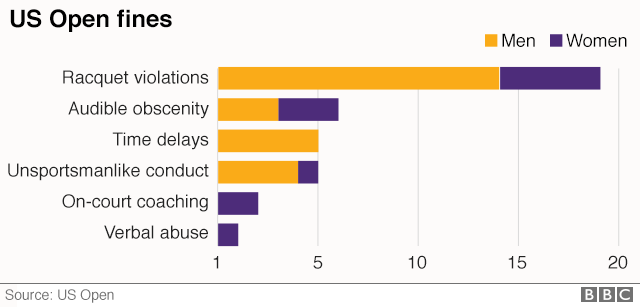US Open 2018: Serena Williams' claims of sexism backed by WTA
- Published
Watch: Serena Williams calls umpire 'liar' and 'thief'
Serena Williams' claims of sexism in the US Open final have been backed by the governing body of women's tennis.
WTA chief executive Steve Simon said the umpire showed Williams a different level of tolerance over Saturday's outbursts than if she had been a man.
She got a code violation for coaching, a penalty point for racquet abuse and a game penalty for calling the umpire a "thief" in the defeat by Naomi Osaka.
The American said it was "sexist" to have been penalised a game.
"The WTA believes that there should be no difference in the standards of tolerance provided to the emotions expressed by men versus women," Simon said in a statement.
"We do not believe that this was done last night."
He also called for coaching to be allowed "across the sport". Umpire Carlos Ramos penalised Williams after seeing her coach, Patrick Mouratoglou, making a hand gesture. The Frenchman later admitted he was trying to coach his player.
The head of the United States Tennis Association (USTA), which organises the US Open, said men "are badgering the umpire on the changeovers and nothing happens".
"We watch the guys do this all the time," USTA chief Katrina Adams said.
"There's no equality when it comes to what the men are doing to the chair umpires and what the women are doing, and I think there has to be some consistency across the board.
"I'm all about gender equality and I think when you look at that situation these are conversations that will be imposed in the next weeks. We have to treat each other fairly and the same."
BBC tennis presenter Sue Barker, who said: "I've sat courtside watching the men ranting at umpires and they haven't been given a violation."
Williams, 36, was fined $17,000 (£13,100) for code violations that included calling Ramos a "liar" and "thief". She earned $1.85m (£1.43m) in prize money for reaching the final.
British former player Andrew Castle said Simon should be "ashamed" of his comments.
"The accusation of sexism which was levelled by Serena Williams in her press conference after the woman's final needs to be backed up," he told BBC Radio Four's Today programme.
"Otherwise she could be accused of bringing the game into disrepute."
Zimbabwean Cara Black, winner of 10 Grand Slam titles in doubles and mixed doubles, said she felt sorry for Ramos.
"He was just doing his job out there and calling Serena on what he saw. She lost control of her emotions. I don't think sexism was a part in it," she said.
"She had a match on her hands against Naomi. I've seen it happen a few times where she starts to bully the situation and try to intimidate her opponents a little bit and she comes with these outbursts."
What do the stats say?
Williams, a 23-time Grand Slam champion, was one of 10 women punished for code violations at this year's US Open, while 26 men were fined.
Most of the fines issued were for racquet violations - 14 men and five women.
Three men and three women were penalised for an audible obscenity, five men were fined for time delays, while four men and one woman were penalised for unsportsmanlike conduct.
Williams was one of only two women punished for on-court coaching, alongside Slovakia's Dominika Cibulkova, while no men were penalised for this offence.
Former world number one Williams was the only player punished for verbal abuse, which landed her a $10,000 (£7,732) fine - the largest issued at this year's tournament.

Code violations at the 2018 US Open tournament
Williams' previous US Open controversies
2009 US Open semi-final: Already on a warning for racquet abuse earlier in the match, Williams launched into an angry outburst at a lineswoman after she was called for a foot fault which gave Kim Clijsters two match points. She was penalised a point for unsportsmanlike conduct and Clijsters won the match. Williams was placed on a two-year probation period and fined $175,000 (£135,000), reduced to $82,500 (£63,750) if she committed no further major offence through 2011.
2011 US Open final: Williams shouts "come on" as Sam Stosur attempts to return a shot and the point was awarded to the Australian. Williams then verbally abused umpire Eva Asderak and was fined $2,000 (£1,265).
Umpire should not have pushed Williams to the limit - Djokovic
Novak Djokovic, who won a third men's US Open title on Sunday, said the interventions by Ramos were "unnecessary" and that they "changed the course of the match".
"I have my personal opinion that maybe the chair umpire should not have pushed Serena to the limit, especially in a Grand Slam final," the Serb said.
But Djokovic said he did not agree with Simon's comments, adding: "I don't understand from where he's coming with that statement."
The 14-time Grand Slam champion also described the situation as "tough" for the umpire and said "we have to empathise with him".
Controversy in women's doubles

American CoCo Vandeweghe says she hopes to "get another moment" at the Australian Open Grand Slam
A day after Osaka was left in tears during an awkward and toxic trophy presentation in which Williams urged booing to stop, there was more controversy in the women's doubles.
American Coco Vandeweghe and Ashleigh Barty of Australia said they were hustled off court shortly before the men's final, unable to deliver a victory speech after receiving their trophy.
"We couldn't thank anyone. I think that was poor form," said Vandeweghe. "Maybe they'll do us right in Australia since the US couldn't do me right."
Barty added they were rushed off because "the men needed to start".
"To be honest, I don't think they [Djokovic and Del Potro] would have worried if they were 10 or 15 minutes delayed," the Australian said.
Inconsistency 'bothers' Azarenka

Williams' coach Patrick Mouratoglou later admitted he was coaching during the second set
Williams was given a code violation in the final after Ramos ruled that her coach Patrick Mouratoglou was signalling tactics from the stands.
After the match, Mouratoglou admitted he had been coaching, but added "I don't think she looked at me" and "everybody does it".
The incident has raised debate on the consistency of the coaching rules which state:
Players can not receive coaching during a Grand Slam match (including the warm-up). Communications of any kind, audible or visible, between a player and a coach may be construed as coaching.
On-court coaching is allowed by the WTA at its Tour-level events.
Coaching from the stands is allowed in the US Open qualifying rounds between points.
Simon said: "We think the issue of coaching needs to be addressed and should be allowed across the sport. The WTA supports coaching through its on-court coaching rule, but further review is needed."
Belarusian two-time Grand Slam champion Victoria Azarenka said it "bothers" her that there is "too much of a grey area" in these rules.
"The umpire can choose to exercise it or not," she said in a live video on her Instagram page. "We either have a rule for all times or we don't. That is my problem with it.
"Why is there so much difference? I don't get that. There has to be a clear rule to it. If it happened in the men's match, it would not happen again. That is the problem. It is the inconsistency."